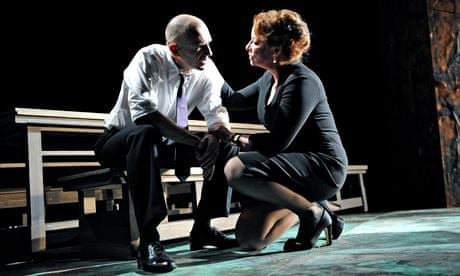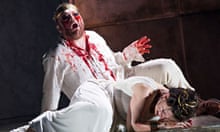I'm a relative newcomer to opera.Seeing films some years ago of Carmen and Don Giovanni whetted my appetite for this music because I could read its meaning on the screen, and since then I have developed a passionate interest. My last excursion was to see Richard Strauss's complex and astonishing Woman Without a Shadow, which thrilled me. But to be brutally honest, I don't think I've ever gone to an opera for the plot. Has anyone?
So, about four years ago, when I was asked to write the libretto for Thebans, it was a project that immediately appealed. It seemed to me that if there was any medium in which to start playing with Sophocles's trilogy, it was opera. The terrible, tragic and to me ultimately triumphant history of Oedipus and his cursed family – with its themes of patricide, incest and murder – is the most moving and threatening story in western literature. Several years ago, I adapted Oedipus the King, the first of the plays, for a National Theatre production with Ralph Fiennes. Ever since, I have wanted to finish these dramas.
The invitation, from the composer Julian Anderson, gave me a framework: to turn all three into one opera. My only worry was that I might find myself working with "a messer" – someone who seems to take perverse delight in turning down what I was offering for the sheer sake of turning it down (I'm thinking of directors I've come across who shall remain nameless). But once I met Julian, my doubts were allayed. He had an integrity, and there was an intelligence to his sense of theatricality. I knew I could trust him. The first thing I said was: I know it will have to be much, much shorter. We looked at a two-page speech. "I can get this down to six lines," I told him – and then did just that.
Perhaps our biggest decision has been to change the order of the plays. I've twice seen them done as a chronological trilogy: Oedipus Rex, Oedipus at Colonus, Antigone. I've also seen Antigone as a standalone play – and I've always thought that putting it at the end of the evening short-changes it remarkably. Although it's the final part of the trilogy, it never feels like the end; in fact, it almost feels as if it were by a different writer. I kept saying things like: "I hope we're going to be very daring with the plot." Luckily, Julian's own instincts about the shape of the opera were the same as mine – or perhaps he picked up on my hints – and we decided to have our opera start with the first play, but then move on to Antigone, and end with Oedipus at Colonus.
These are works that speak directly to me. I can only do plays when they touch me to the core, and at the very heart of these three is an awesome and brutal truth. Our fathers fail us, and then we fail our fathers. I know who Oedipus is because there's a very large chunk of my father in him, and I know who Antigone is because there's a very large chunk of me in her. I understand her: I completely accept that if my brother were left without a burial, I would also seek to kill the man who stopped me from doing it myself. I understand the intimacy of Antigone's defiance: that is my background, that is my politics, too. And so I wanted to do justice to her. Her spiritual, psychic and sexual journey in the trilogy is as threatening and as challenging as Oedipus's own. For me, the heart of why she behaves as she does is because, as a child, she witnessed the horror that happened to her father. So I felt you had to leave until the end of the evening the cry of loss and isolation, of pity and terror, that we have in the last lamenting notes of his daughter in Oedipus at Colonus, which closes our opera.
Like many people, I struggled with the chorus. I've sat through terrible productions of Greek tragedies where it was like some kind of Pan's People troupe moving around the stage in dreadful, stilted formation. It was only by going through the plays line by line that I was able to recognise how disciplined Sophocles was as a playwright, how he expanded the use of the chorus to enrich and layer the plays. Realising that there's no hard and fast rule for what they're going to say or how they're going to behave – they're as unpredictable, self-serving and complex as every other character – was a great liberation, but even so, you have to be bold.
My brief to myself, whenever I'm tackling any such Greek play, is that if I do not understand the intricacies of the chorus's mythological references, then I take the liberty of simplifying, while rooting it in the literal translation I work from. If a reader wants to find out more, there are plenty of exceptionally good scholarly texts; me, I'm trying to make this accessible, and to write as beautiful a text as I can for the singers to sing. And that is what I think they are, these stories that have haunted us: they are something beautiful, something brutal, and the beauty and brutality confound each other.




Comments (…)
Sign in or create your Guardian account to join the discussion